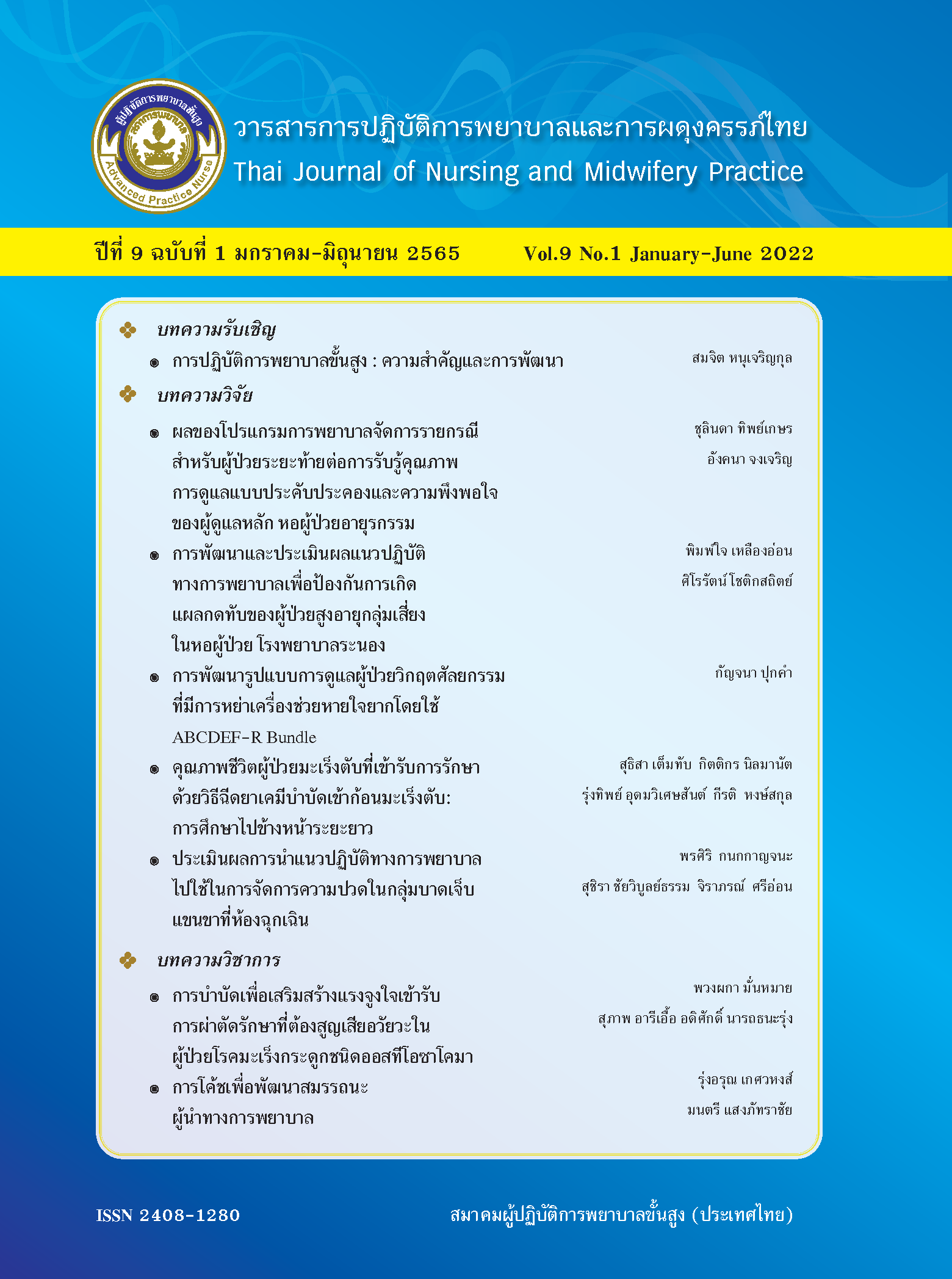Effects of an End-of Life Case-based Nursing Management Program on Perceived Quality of Palliative Care and Satisfaction of Primary Caregivers at Medical wards
Main Article Content
Abstract
This one-group experimental research, with a pre-posttes design aims to compare the perceived quality of care and satisfaction of family caregivers who participated in end-of-life case-based nursing management program. Purposive sampling was used to select 30 primary caregivers who provided care of patients in the terminal stage. Samples received end-of-life case-based nursing management program consisted of 5 steps including 1) identifying and selecting the case of most complex and difficult problems; 2 conducting comprehensive assessment and determining health problems; 2) planning for care as health demands; 3) implementing care management; and 4) evaluating outcome. Data were collected using the perceived quality care scale and caregiver satisfaction questionnaires which yielded internal consistency reliability value of .76 and .73 respectively. The data were analyses using descriptive statistics and pair t-test. The results of this study revealed that after participating in the end-of-life case management program, samples reported significant an improvement of perceived quality of care (t = -57.16, p < .000) and the caregivers’ satisfaction was at high level. It is suggested that palliative care center or unit should apply this case management nursing programmer for end-of-life patients and caregivers, in order to and improve the quality of care.
Downloads
Article Details

This work is licensed under a Creative Commons Attribution-NonCommercial-NoDerivatives 4.0 International License.
References
Watson, Max, et al. (ed.). Oxford handbook of palliative care. Oxford University Press, USA, 2019.
Sahmaae, N., Nilmanat, K., & Kongsuwan, W. Muslim pPrimary cCaregivers’ eExperience in cCaring for tTerminal-sStage cCritically iIll pPatients in the ICU wWard. Thai Journal of Nursing Council 2013; , 28(3):, 31-43. 2013. (In Thai)
Robinson, J., Gott, M., & Ingleton, C. Patient and family experiences of palliative care in hospital: What do we know? An integrative review . Palliative Medicine 2014; 28(1): 18-33.
Pasri, P., Isaramalai, S., & Hattakit, U. Family Caregivers’ Support Needs in Caring
for End Stage Cancer Patients. Songklanagarind Journal of Nursing 2015; 35(2): 79-92. (In Thai)
Fongkerd, S., & Poogritsana, S. Effect of illness beliefs model program on the families suffering from taking care end state cancer patients. Nursing Journal of the Ministry of Public Health 2013; 23(3): 122-131.
Spettell CM, Rawlins WS, Krakauer R, Fernandes J, Breton MES, Gowdy W, et al. A Comprehensive Case Management Program To Improve Palliative Care. J Palliat Med. 2009; 12(9): 827-32.
Dumont I, Dumont S, Turgeon J. Continuity of care for advanced cancer patients. J Palliat Care. 2005; 21(1): 49-55.
Luckett T, Phillips J, Agar M, Virdun C, Green A, Davidson PM. Elements of effective palliative care models: a rapid review. BMC Health Serv Res. 2014; 14: 136.
Silveira MJ, Forman J. End-of-life care from the perspective of primary care providers. J Gen Intern Med 2012; 27(10): 1287-93.
Spettell CM, Rawlins WS, Krakauer R, Fernandes J, Breton MES, Gowdy W, et al. A Comprehensive Case Management Program to Improve Palliative Care. J Palliat Med. 2009; 12(9): 827-32.
Faul, F., Erdfelder, E., Buchner, A., & Lang, A. G. Statistical power analyses using G*Power 3.1: Tests for correlation and regression analyses. BRM 2009; 41: 1149-60.
Nilmanat K, Sae-Chit K. Effects of a case-based management nursing programme for terminally ill patients on their perception of symptom-induced suffering and terminal care quality. Thai J Nurs Council 2018; 33(3): 52-66.(In Thai)
Quill TE, Abernethy AP. Generalist plus specialist palliative care — creating a more sustainable model. N Engl J Med. 2013; 368(13): 1173-5.
Chewaskulyong B, Sapinun L, Downing GM, Intaratat P, Lesperance M, Leautrakul S, et al. Reliability and validity of the Thai translation (Thai PPS Adult Suandok) of the Palliative Performance Scale (PPSv2). Palliat Med 2012; 26(8): 1034-41. (In Thai)
Penpassorn Mamphong. Assessment of care for terminally ill critically ill patients and mortality by family members Adult Nursing Department]. Khon Kaen: Khon Kaen University; 2013.
Morita, T., Hirai, K., Sakaguchi, Y., Maeyama, E., Tsuneto, S., &Shima, Y. Measuring the quality of structure and process in end-of-life care from the bereaved family perspective.Journal of pain and symptom management 2004; 27(6): 492–501.
Nursing services division, Maharajnakorn Chiangmai Hospital. (n.d.). Family Satisfaction Questionaire. Retrived from http://www.med.cmu.ac.th/hospital/nis/palliative.html
Wongrattana, C. Statistical technique for research. (11th ed.) Bangkok: Thepnaruamitt Publisher 2009; (in Thai)
Sapinan, L. Manual for Palliative care outcome scale: POS. Chiang Mai: Klang Veing Publisher 2013; (in Thai)
Sindhu, S., & Wongrot, P. (Eds.). Case management for patietns with diabetes and hypertension. (2nd ed.). Bangkok: Wattana Publisher 2014; (In Thai)
Chongjarearn, A. & Cheumnok, W. Challenges of nurses in developing a palliative care innovation in Thailand. Thai Journal of Cardio-Thoracic Nursing. 2021; 32(2):1-15. (In Thai)
Molek, R., Binhosen, V., & Pakdevong, N. (2015). Symptom intensity in persons with advanced cancer receiving palliative nursing care protocol and caregivers’ satisfaction. Journal of Nursing and Health Care 2015; 33(2): 102-109.
Glajchen, M., & Goehring, A. (2017). The family meeting in palliative care: Role of the oncology nurse. Seminars in Oncology Nursing 2017; 33(5): 489-497.
Rietjens, J. A. C., Sudore, R. L., Connolly, M., van Delden, J. J., Drickamer, M. A., Droger, M., et al. Defnition and recommendations for advance care planning: an international consensus supported by the European Association for Palliative Care. The Lancent Oncology 2017; 18(9): 543-551.
Nantachaipan, P. (2015). Case Management in the care for patients at the end of life. Nursing Journal 2015; 42(1): 153-158


